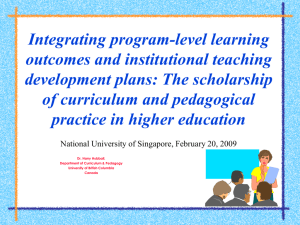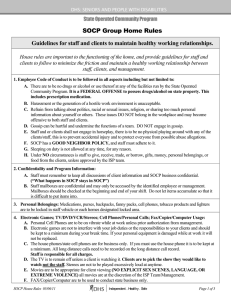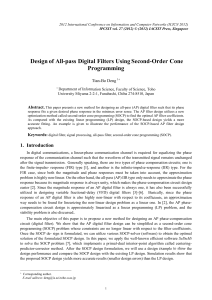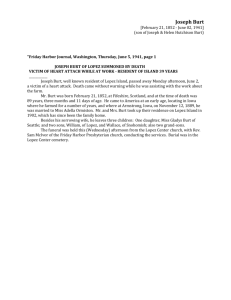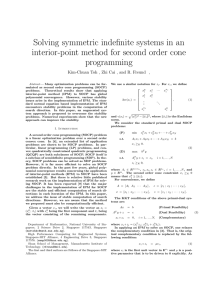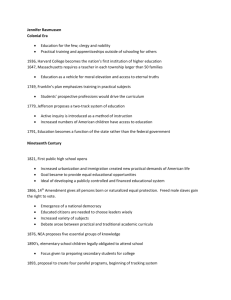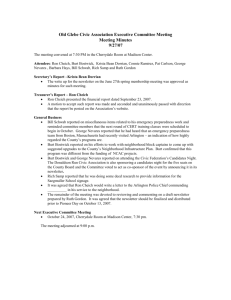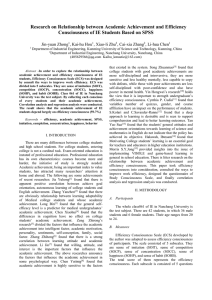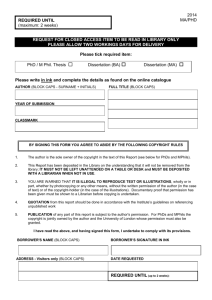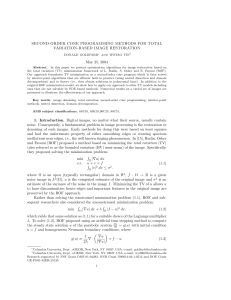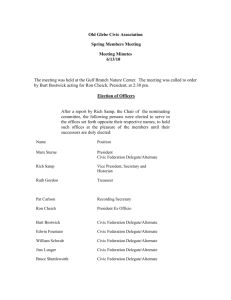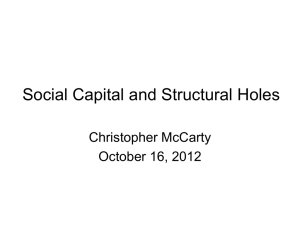UBC Certificate Program On Teaching in Higher Education
advertisement
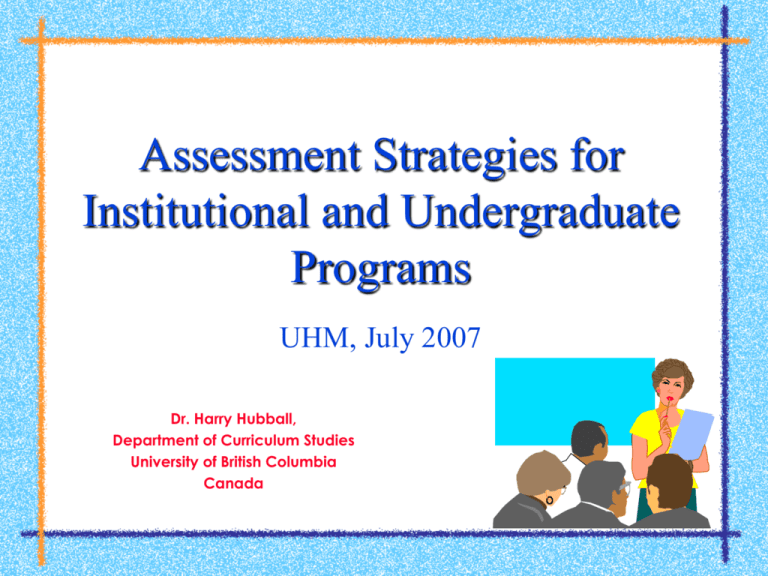
Assessment Strategies for Institutional and Undergraduate Programs UHM, July 2007 Dr. Harry Hubball, Department of Curriculum Studies University of British Columbia Canada Outline UHM, June 28 • Global Context for Curricula Reform in Higher Education • Theory-Practice Integration: Innovative Learning Strategies • Critical Challenges, Stages, Curriculum/Faculty Support Initiatives UHM, July 25th • Program-level Assessment and Learning Outcomes • Action Research Methodology: Case Study Findings in College, institutional and Provincial Settings • The Scholarship of Curriculum Practice and Undergraduate Program Reform: Dissemination (PAIMAP) Stages of Curricular Reform Practice Stage Action Plan Stage Mobilisation Stage Initiative Stage Awareness Stage Pre-Awareness Stage Hubball & Burt, 2004 The WASC/Hawaii Department of Education Criteria 1. Organization: Vision and Mission (Purpose); School Culture; Governance, Leadership, and Resources 2. Standards-based Student Learning: Curriculum (What are students learning?) 3. Standards-based Student Learning: Instruction (How are students learning?) 4. Standards-based Student Learning: Assessment and Accountability (How is student assessment used?) 5. Quality Student Support for Student Personal and Academic Growth http://www.acswasc.org/about_criteria.htm#hawaiicriteria SoCP . . .An approach to undergraduate program reform and curriculum development in higher education that integrates research, teaching and learning 1. Scholarly Approaches to Curriculum Practice “On-going professional development, reflection and initiation of positive changes to curricula practices” ….Taking this to the next level of rigour 2. The Scholarship of Curriculum Practice (SoCP) “Dissemination of practice-driven curricula research in peerreview contexts” (Hubball & Burt, 2007; Hubball & Gold, In press) Action/Classroom Research Methodology: A Scholarly Approach to Programming and Curriculum Practice • • • • • • • • systematic, intentional and reflective inquiry Identify research problems/questions/hypothesis Literature review and conceptual framework Planning, action, observation and reflection Research design, methodology, data analysis, conclusions Theory-practice integration Implementing change/dissemination Individual and social contextual process (Altrichter, Psch, & Somekh, 1993; Mills, 2000; Peterat & Smith, 2001; Thompson, 1996; Winter, 1996) Integrating Theoretical Frameworks (SoCP) • • • • Models of Context-based Learning Models of Learning Communities Models of Learning-centred Curricula and Pedagogy in Higher Education Models of Action Research and SoTL (Cox & Richlin, 2004; Hansman, 2001; Green & Kreuter, 1999; Hubball & Burt, 2004, 2006; Hubball & Poole, 2004; Lave & Wenger, 1991;Peterat & Smith, 2001; Pratt & Asociates, 2001) Organisational Structure Needs Assessment Resources LEARNING CONTEXT SOCIAL CONTEXT PLANNING AR Process - Impact - Follow-up ASSESSMENT PROGRAMMING (Hubball & Burt, 2004) A Learning-centred Framework for Curriculum Development and Evaluation Program Completion Program Start E-3 E-1 E-2 PROGRAM EVALUATION PHASES CONTEXT CONSIDERATIONS: Audience, Objectives, Resources for Evaluation Projects E-1: Learning Context Evaluations E-2: Process Evaluations E-3: Impact Evaluations E-4: Follow-up Evaluations (Green & Kreuter, 1999; Hubball & Burt, 2007;Priest, 2001) E-4 Table 2. Implementation Analysis ______________________________________________ Q. 1 What are critical factors when developing programlevel learning outcomes? Q. 2 To what extent are learning outcomes reflected in program learning experiences? Q. 3 When and how do students demonstrate learning outcomes in this context? Q. 4 What are the overall reflections for implementation and alternative applications of learning outcomes to other academic activities in this context? Action Research Methodology: Data Collection & Analysis Methods (Quantitative and Qualitative) • • • • Minutes of Curriculum meetings Focus group meetings with curriculum stream leaders’ Review of course syllabi and samples of students’ work Review of course evaluation, student and pharmacists’ survey data • Review of faculty research activities related to SoTL GRADUATION External Clerkships Integrated Case-based Courses Yr 4 Courses CAPS Yr 3 Courses CAPS Program Sub-Disciplines Yr 2 Courses CAPS Pre-requisite courses from Arts and Sciences CAPS Ability-based Outcomes & Assessment Strategies Yr 1 Courses PETE 314/320: ASSESSMENT PROFILE Methods Start Presentation Formative Summative Learning O/C End 1-2,4-8 Participation 2-3 Final/Review 1-2,5-8 Unit Project 1-2,5-8 File/Journal 1,2, 4,9 Research Outcomes & Key Lessons Learned: SoCP and Implementation Analysis • Accreditation was the single biggest factor to influence the implementation of program-level learning outcomes • Strong (and adequately supported) curriculum leadership and the ability to engage the WHOLE learning community (including a critical mass within the sub-disciplines), through open dialogue and various communications and dissemination of SoCP • Flexibility to align bottom-up and top-down LO processes • Guest speakers and external consultants • Substantial time, effort and varying degrees of contribution and responsibility requires comprehensive Institutional and Faculty-level support/structures - Surface & deep levels of SoCP • Additional support required to target, champion and show-case best practices (innovation-leadership-integration) Hubball & Gold, 2007 SUPPORTING CURRICULAR & TEACHING CONTRIBUTIONS IN ORDER TO REALISE INSTITUTIONAL GOALS INSTITUTIONAL AND FACULTY LEVELS • Tenure and Promotion Process • Curriculum Leadership Awards • Innovative Course Design Awards • SoCP Grant Funding Opportunities • SoCP Excellence Awards • Faculty Certificate Program: The Scholarship of University Teaching and Learning (SoTL) • Curriculum Development and Pedagogy Support Service PROGRAM-LEVEL ASSESSMENT AND LEARNING OUTCOMES Thank you….DISCUSSION - Welcome! * Questions? * Challenges / Alternative Strategies? * Comments/reflections?
